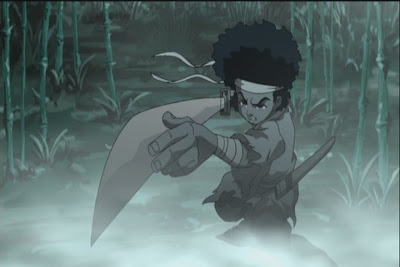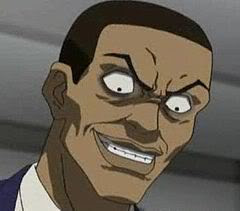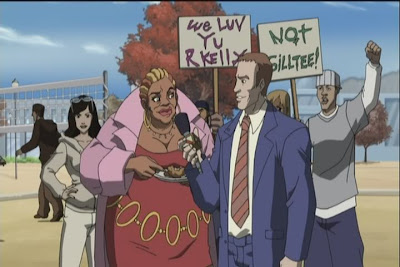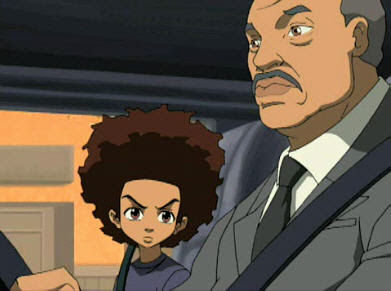
May 2nd marks the long-awaited third season of Cartoon Network's animated series, The Boondocks, based on Aaron McGruder's popular comic strip of the same name, which ran until 2006. The series offers sharply-scripted satire about an African American family transplanted into a mostly-white suburb. The Boondocks has attracted its fair share of controversy for its often hard-hitting racial humor, its sometimes misogynistic and homophobic language and its almost constant use of the word "nigga."
The Boondocks features lots of memorable characters, but the heart and conscience of the show is young Huey Freeman, an afro'd, precocious, martial-arts trained, kid who considers himself a throwback to the black power movement of the 1960's. As reprehensible as some of his surrounding characters can be, we can almost always count on Huey to be the voice of responsibility and commonsense. If the show were not so often from Huey's voice, it would be an exercise in awful stereotypes and shock humor. His brother is Riley, a wanna-be gangsta, who is obsessed with the violent and materialistic side of Hip-Hop culture. The two boys are being raised by their grandfather, Robert Freeman, a crotchety relic of the Civil Rights movement who is trying to enjoy a quiet retirement. The most controversial character is Uncle Ruckus, a black white supremacist who is constantly spouting some of the most awful racial epitaphs and black stereotypes you have ever heard.
Despite the painfully long production gaps between seasons (this is rumored to be the last one) and the very uneven second season, The Boondocks deserves to stand with series like The Simpsons and South Park as one of the funniest and smartest animated shows of all time. In addition to sometimes brilliant writing, The Boondocks also features high quality Japanese-style animation and is often beautiful to look at in a time when the norm for animated comedy programs is animation that is cheap and ugly.
It's been a couple of years since the last episodes of the show have aired and the racial equation has changed somewhat in America. I am curious to see how The Boondocks will fare in the supposedly post-racial Age of Obama. The first episode of season three looks to take this topic on and is called, "It's a Black President, Huey Freeman." Sadly, comedy waits for no man, and I can't help feeling like this was an episode that should have aired a lot sooner, but for The Boondocks, I am willing to set the clock back a year and a half.
In preparation for the new season lets count down the top ten episodes from seasons one and two.
 10. "Attack of the Killer Kung Fu Wolf Bitch," Season 2. The Boondocks is sorely lacking strong female characters and can often lapse into a kind of cheerful misogyny (despite the fact that Huey and Riley are both voiced by a woman). African-American women in particular usually only appear as crazy or prostitutes on the show, and "Attack of the Killer Kung Fu Wolf Bitch" introduces us to Luna, who is the former. As part of his ongoing attempts to hookup online, Granddad makes a date with Luna, a beautiful young woman with a tragic past, low self-esteem, deadly Kung Fu skills, and a girlfriend who is constantly feeding her unhealthy relationship advice via a Bluetooth headset. Luna actually turns out to be a fairly sympathetic and appealing character, which is a shame because the episode treats her pretty badly.
10. "Attack of the Killer Kung Fu Wolf Bitch," Season 2. The Boondocks is sorely lacking strong female characters and can often lapse into a kind of cheerful misogyny (despite the fact that Huey and Riley are both voiced by a woman). African-American women in particular usually only appear as crazy or prostitutes on the show, and "Attack of the Killer Kung Fu Wolf Bitch" introduces us to Luna, who is the former. As part of his ongoing attempts to hookup online, Granddad makes a date with Luna, a beautiful young woman with a tragic past, low self-esteem, deadly Kung Fu skills, and a girlfriend who is constantly feeding her unhealthy relationship advice via a Bluetooth headset. Luna actually turns out to be a fairly sympathetic and appealing character, which is a shame because the episode treats her pretty badly.Despite the mishandling of the Luna character, this is one of the more fun and energetic Season 2 entries and has some of the series' best animation. Also, this is one of the few cases where the martial arts sequences are not gratuitous and actually feel like an organic part of the story. Look for the hilarious references to Enter the Dragon and Mortal Kombat.
 9. "Granddad's Fight," Season 1. This one introduces us to Colonel Stinkmeaner, a supernaturally hateful and mean old blind man, who gets into an unnecessary altercation with Granddad in the parking lot of a shopping mall, what Huey terms a "nigga moment."
9. "Granddad's Fight," Season 1. This one introduces us to Colonel Stinkmeaner, a supernaturally hateful and mean old blind man, who gets into an unnecessary altercation with Granddad in the parking lot of a shopping mall, what Huey terms a "nigga moment."Egged on, Granddad decides to fight the old man with tragic results. This episode has some great animation, such as Huey's martial arts fantasy sequence and a great voice performance from Cedric Yarbrough, who normally voices the uptight Tom Dubois but gets to let loose with the awful Stinkmeaner.
 8. "The Itis," Season 1. This episode is a great meditation on the relationship between food and community, as Granddad is given the opportunity to open a special soul food restaurant where he features The Luther, a bacon cheeseburger with a pair of Krispy Kreme donuts in place of a bun. This episode is from Huey's point of view and the highlight is his hilarious interpretation of the plot of the movie Soul Food. This episode is an example of why The Boondocks is a great satire, and its targets are not only the larger American establishment, but aspects of African American culture that are unhealthy or counterproductive as well.
8. "The Itis," Season 1. This episode is a great meditation on the relationship between food and community, as Granddad is given the opportunity to open a special soul food restaurant where he features The Luther, a bacon cheeseburger with a pair of Krispy Kreme donuts in place of a bun. This episode is from Huey's point of view and the highlight is his hilarious interpretation of the plot of the movie Soul Food. This episode is an example of why The Boondocks is a great satire, and its targets are not only the larger American establishment, but aspects of African American culture that are unhealthy or counterproductive as well.
7. "A Date With The Health Inspector," Season 1. This episode begins with Tom Dubois' hilariously graphic nightmare about being accosted in a prison shower by an inmate who calls himself "The Health Inspector." It turns out Tom is wrongly suspected of being the "X-Box Killer" and is in danger of having his worst nightmare come true.
Huey and Riley team up with Ed Wuncler III and his pal Gin Rummy to find the real killer before Tom is sent to "real prison." In the same way that Ed is vaguely based on George W. Bush, Rummy is physically based on Donald Rumsfeld but voiced by Samuel L. Jackson. Ed and Rummy pop up in a lot of forgettable episodes but their chemistry and banter are always entertaining. The rest of the episode is a hilarious and sustained satire of how we got into the Iraq War with some nods to Pulp Fiction.
 6. "The Story of Gangstalicious Part 2," Season 2. Gangstalicious, having survived the repercussions of his "Thuggin' Love" in Season 1, and releases a new single, "Homies over Ho's." Riley, having blocked the traumatic events of his previous encounter with Gangstalicious, still seeks to emulate his idol, leading Granddad to suspect he might be turning gay, which is surprising because Riley is always talking about how "gay" everything is. This is all tied in with some footage of a fictional pair of gay rappers who came out in the '80's and talk about whether the Hip Hop world will ever be able to accept an openly gay rapper. This is a surprisingly respectful and nuanced take on the subject matter and has an inconclusive, bittersweet ending. I hope we see learn the fate of Gangstalicious in season 3.
6. "The Story of Gangstalicious Part 2," Season 2. Gangstalicious, having survived the repercussions of his "Thuggin' Love" in Season 1, and releases a new single, "Homies over Ho's." Riley, having blocked the traumatic events of his previous encounter with Gangstalicious, still seeks to emulate his idol, leading Granddad to suspect he might be turning gay, which is surprising because Riley is always talking about how "gay" everything is. This is all tied in with some footage of a fictional pair of gay rappers who came out in the '80's and talk about whether the Hip Hop world will ever be able to accept an openly gay rapper. This is a surprisingly respectful and nuanced take on the subject matter and has an inconclusive, bittersweet ending. I hope we see learn the fate of Gangstalicious in season 3. 5. "Stinkmeaner Strikes Back," Season 2. Apparently too unpleasant for Hell, Stinkmeaner returns to get his revenge on the Freeman family by possessing Tom. Like many of the season 2 entries, "Stinkmeaner Strikes Back" takes a step away from the more reality-grounded episodes, and lets loose with a lot of craziness and over-the-top action. Ultimately, Uncle Ruckus (who, among his many jobs is a Reverend in the Church of White Jesus, in a callback to season one's "The Passion of Uncle Ruckus") comes in to perform an exorcism in a scene for which the only adjective is "wrong." But hilarious. Cedric Yarbrough is great and somehow even more unhinged as Tom-as-Stinkmeaner, than he was in that character's first episode. I hope we see another Stinkmeaner episode in Season 3, maybe "Son of Stinkmeaner?"
5. "Stinkmeaner Strikes Back," Season 2. Apparently too unpleasant for Hell, Stinkmeaner returns to get his revenge on the Freeman family by possessing Tom. Like many of the season 2 entries, "Stinkmeaner Strikes Back" takes a step away from the more reality-grounded episodes, and lets loose with a lot of craziness and over-the-top action. Ultimately, Uncle Ruckus (who, among his many jobs is a Reverend in the Church of White Jesus, in a callback to season one's "The Passion of Uncle Ruckus") comes in to perform an exorcism in a scene for which the only adjective is "wrong." But hilarious. Cedric Yarbrough is great and somehow even more unhinged as Tom-as-Stinkmeaner, than he was in that character's first episode. I hope we see another Stinkmeaner episode in Season 3, maybe "Son of Stinkmeaner?"
4. "Guess Hoe's Coming to Dinner," Season 1. Granddad gets involved with a suspiciously young and beautiful woman, Cristal, who soon moves in with the family and begins spending lots of his money. Riley and Huey conspire to get rid of Cristal, whom they correctly have guessed is a "ho." This episode marks the first appearance of the superbly oily and awkwardly named pimp, A Pimp Named Slickback (voiced by Katt Williams).
 3. "The Story of Gangstalicious," Season 1. This is the best of the Riley-centric episodes and when he finds out that his idol Gangstalicious has been shot and is recuperating at a near-by hospital, Riley goes to meet him and gets involved in some unexpected drama, finding out not only that his idol is inept with a handgun and unable to jack a car but that there is also a hidden meaning behind his song "Thuggin Love." This episode is a great commentary on masculinity and Hip Hop culture and features the first appearance by Mos Def as Gangstalicious, one of the most interesting and compelling characters on the show.
3. "The Story of Gangstalicious," Season 1. This is the best of the Riley-centric episodes and when he finds out that his idol Gangstalicious has been shot and is recuperating at a near-by hospital, Riley goes to meet him and gets involved in some unexpected drama, finding out not only that his idol is inept with a handgun and unable to jack a car but that there is also a hidden meaning behind his song "Thuggin Love." This episode is a great commentary on masculinity and Hip Hop culture and features the first appearance by Mos Def as Gangstalicious, one of the most interesting and compelling characters on the show. 2. "The Trial of R. Kelly," Season 1. A recurring theme of The Boondocks is tension between black intellectual culture and black popular culture, as represented by the eternal conflict between Huey and Riley. The two brothers end up on opposite sides of the R. Kelley case and this episode even features an extended anime-style fight scene between a small group of elites led by Cornell West and a bunch of very stereotypical black characters outside of the courthouse. This is the infamous episode in which a chicken wing was thrown at Rosa Parks but that scene was removed out of respect to her then-recent death but is included as a deleted scene on the DVD. Adam West does a great job voicing a slimy lawyer defending R. Kelley.
2. "The Trial of R. Kelly," Season 1. A recurring theme of The Boondocks is tension between black intellectual culture and black popular culture, as represented by the eternal conflict between Huey and Riley. The two brothers end up on opposite sides of the R. Kelley case and this episode even features an extended anime-style fight scene between a small group of elites led by Cornell West and a bunch of very stereotypical black characters outside of the courthouse. This is the infamous episode in which a chicken wing was thrown at Rosa Parks but that scene was removed out of respect to her then-recent death but is included as a deleted scene on the DVD. Adam West does a great job voicing a slimy lawyer defending R. Kelley.
1. "The Return of the King," Season 1. This is another one of the those episodes that steps away from reality a bit but carries the show in the direction of great satirical social commentary. "Return of the King" presents the premise of "What if Martin Luther King had not been assassinated in Memphis in 1968 but instead had been in a coma all these years? What would he make of contemporary America, especially black America if he woke up in 2006?" The episode veers off into Austin Powers styled fish-out-of-water comedy a couple of times but presents the audience with a lot of challenging questions about where where we've all come as a country since the 1960's and the legacy of the Civil Rights movement.

No comments:
Post a Comment